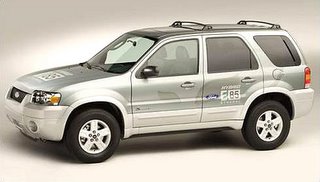Ford unveils flexible fuel hybrid Escape; plug-in hybrids pushed by coalition
Ford Motor Co. is taking two increasingly popular gasoline-saving technologies and putting them in the same vehicle. The company has built a Ford Escape Hybrid that also is a flexible-fuel vehicle. The internal combustion engine teamed with an electric motor in the hybrid configuration is capable of running on E85 as well as gasoline, the company says.
The company has built a Ford Escape Hybrid that also is a flexible-fuel vehicle. The internal combustion engine teamed with an electric motor in the hybrid configuration is capable of running on E85 as well as gasoline, the company says.
E85 is 85 percent ethanol and 15 percent gasoline. Ethanol generally is produced from corn in farm states. But automakers and others are touting opportunities to make ethanol economically from plant waste as an alternative to imported petroleum.
The vehicle was unveiled at the Washington Auto Show on Wednesday.
Ford executives say the flexible-fuel hybrid is a research vehicle at this point. They conceded in prepared remarks that technical obstacles remain before it could be produced. A big obstacle is controlling evaporative emissions, they said.
Still, Anne Stevens, Ford COO for the Americas, said: "This innovative research program could lead to breakthroughs to significantly reduce our nation's dependence on imported oil while also helping to address global climate change."
Ford is not alone in wanting to combine fuel-saving technologies.
A coalition of groups on Tuesday told of a campaign to pressure automakers to build hybrids that could be plugged in when they are not in use, to charge battery packs that are heftier than those in existing hybrids.
The argument for plug-in hybrids is that they would run more in the electric-only mode than existing hybrids do, especially on short trips and daily commutes. Proponents say plug-in hybrids would save more energy and produce less pollution than the hybrids produced so far.
Sen. Orrin Hatch, R-Utah, supports the coalition. He said a plug-in hybrid, especially one that uses alternative fuel, could be a "silver bullet" for the nation's auto-related environmental problems and dependence on foreign oil. He was an author of federal tax credits for hybrids and other advanced-technology vehicles, which took effect Jan. 1.
The plug-in hybrid coalition includes city governments, electric utilities, environmental groups and national security organizations.
Automakers, stung by their experiences with all-electric vehicles, generally have downplayed the promise of plug-in hybrids.
At the Washington show Wednesday, Stevens of Ford was asked about plug-in hybrids. She said the company is interested in all kinds of technology but there are concerns about the durability of the heftier battery packs needed by plug-ins.
Peter Savagian, engineering director at General Motors Powertrain, said his company is looking into plug-ins, along with other technologies, and is "kind of intrigued by the concept."
Separately, in its own show announcement, GM unveiled ads that will be used in its new campaign to build consumer interest in E85 fuel.
The campaign slogan is, "Live Green, Go Yellow," referring to the corn from which ethanol is usually made.
Energy Secretary Sam Bodman toured Ford, GM and DaimlerChrysler exhibits on Tuesday. He announced the release of $119 million in federal funding toward further government-industry research on developing hydrogen-powered fuel cell vehicles.
President Bush made hydrogen a priority in his 2003 State of the Union address.
Source: © By Harry Stoffer /Automotive news/ autoweek.com